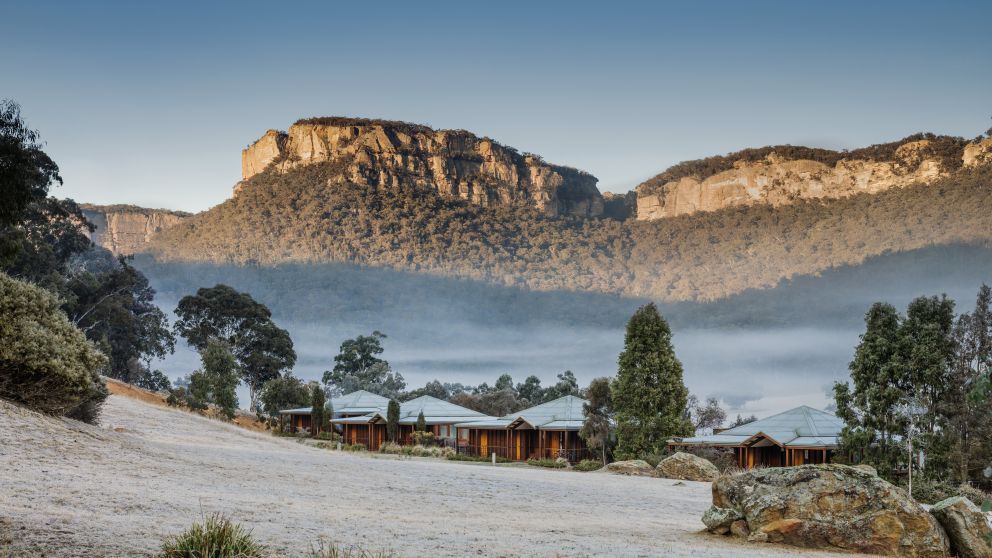
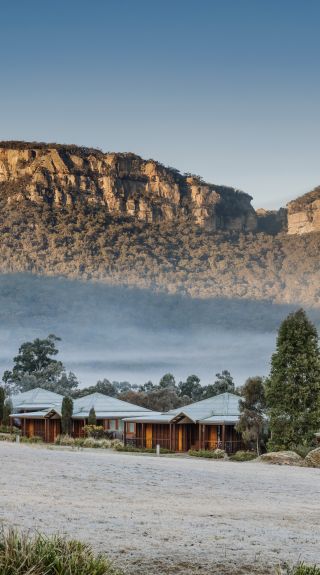
Enjoy a holiday with heart at one of these sustainable stays
Emirates One&Only Wolgan Valley, Blue Mountains
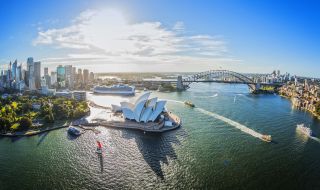

Destination NSW
A former saw milling site, a dairy farm and B&B, this scenic 17-hectare property has had many incarnations, but its life as Tanja Lagoon Camp has been the kindest to the land. Nestled in Mimosa Rocks National Park, 7000-plus native trees have been planted, fences have been removed to create a wildlife corridor, and the site was constructed with minimal impact after consultation with the Local Aboriginal Land Council. The glamping tents are solar-powered and naturally ventilated, all water use is from rainwater, and all waste is processed on site.
How to get involved:
An education centre is in future plans, where guests can get involved in citizen science projects, outdoor guide training, and learn about permaculture principles and sustainable living.
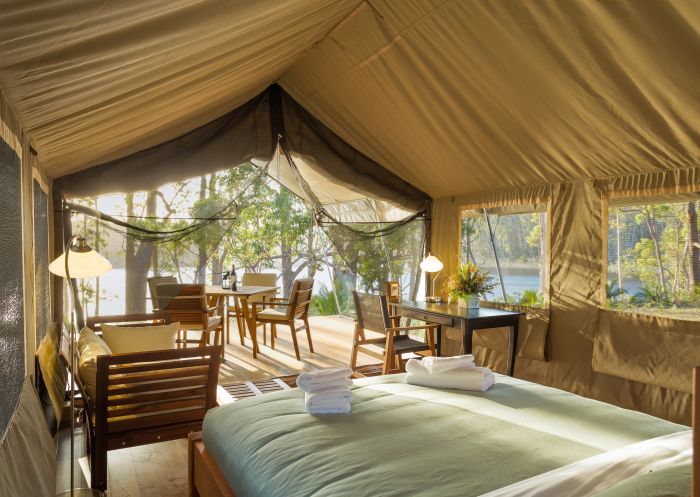
Tanja Lagoon Camp, Sapphire Coast
Krestel Nest Ecohut is a small-scale ethical farm and occupies just one-third of a sprawling 330-hectare property; the remainder is a conservation zone for box gum grassy woodlands. Blissfully disconnect in the off-grid retreat perched above a rocky mountain stream, complete with fireplace, wraparound verandah and outdoor bath. The hut was built with recycled materials, is solar and battery powered, naturally insulated, and stocked with hand-made soap and tree-free toilet paper.
How to get involved:
The farm sits on the traditional lands of the Wiradjuri Nation, with several significant cultural artefacts found on the property. Look out for an Indigenous-led tour on offer soon.
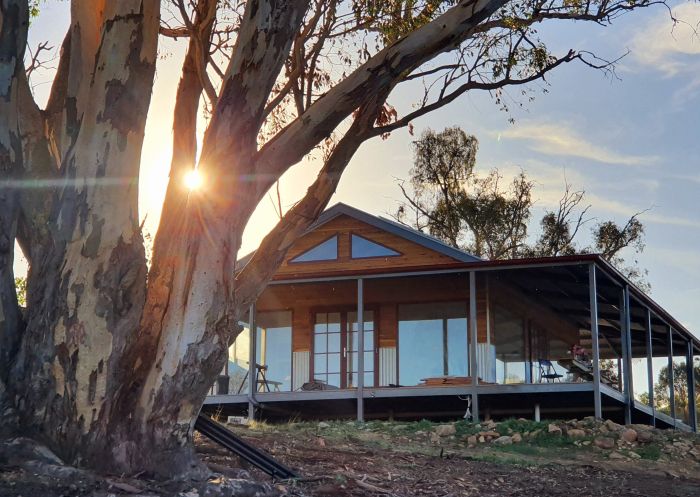
Kestrel Nest EcoHut, Snowy Valleys
Crystalbrook Kingsley is located in the 1970s heritage-listed Roundhouse building, this sophisticated new stay has serious eco cred. The hotel is paperless, bathroom amenities are in refillable pump bottles, used coffee capsules are recycled; even the coat hangers are reincarnated from pressed cardboard. There are complimentary bikes to explore the city and Crystalbrook has also started to label its menus with ‘climate calories’, which reveal if ingredients are locally sourced (hint: 80 per cent of fresh produce is), sustainable, native, and eco-friendly; all unused food is donated to OZHarvest.
How to get involved:
Opt out of having your room serviced and each time you’ll be rewarded with a $10 food and beverage credit!
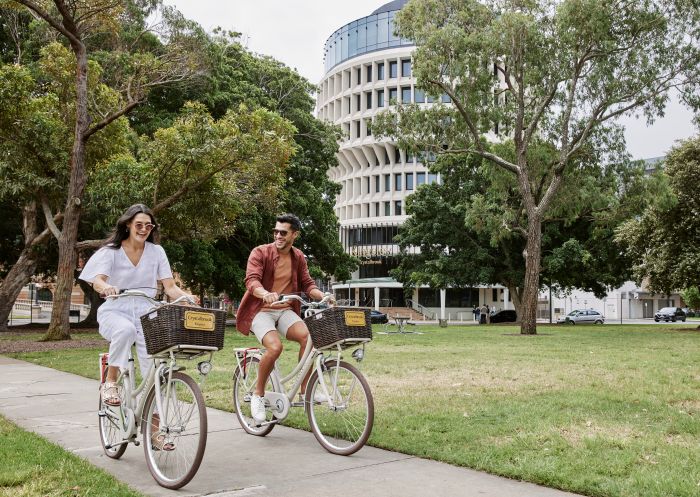
Crystalbrook Kingsley, Newcastle
What better way is there to learn about Australia’s unique wildlife than to momentarily live alongside them at Taronga Wildlife Retreat. Set within a purpose-built sanctuary at Taronga Zoo Sydney, the retreat has been constructed with a low environmental footprint using engineered wood, solar panels, recycled water systems, and energy efficient technology. Choose an Animal View room to spot native wildlife right outside your window.
How to get involved:
Become a Taronga Zoo parent and adopt one of your favourite endangered species for a year. From koalas to red pandas, your adoption fee goes toward research and education, and assist with their conservation, breeding and preservation of habitats.
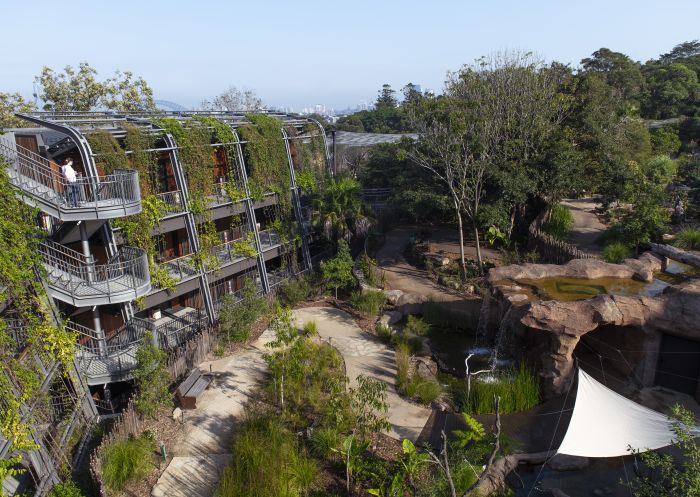
Taronga Zoo Sydney, Mosman
From an old farm to a thriving eco getaway, Broger’s End is a 65-hectare property set on Upper Kangaroo River, home to wild platypus. The old farm shed and dairy have been lovingly transformed into self-contained accommodation using reclaimed materials; both powered by solar panels and battery. Water use is 100% collected rainwater, food scraps are composted on site, and the organic gardens make for a living supermarket, filled with herbs, vegetables and fruits, with eggs from the chickens.
How to get involved:
Browse the eco farm shop where raw, pure honey – made from the resident honeybee hives – can be purchased.
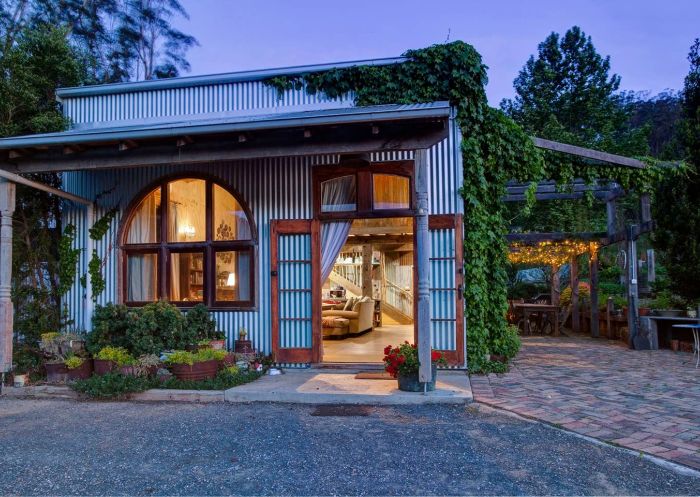
Broger’s End, Kangaroo Valley - Credit: Broger’s End
The Comfort Inn City is a family-run hotel located in the Armidale CBD and packs a punch when it comes to sustainability, offsetting its carbon footprint by sponsoring a wind farm in India and achieving carbon neutrality in 2019. The hotel uses solar power, LED lighting and state-of-the-art systems to produce hot water, has all but omitted paper waste, and has an on-site herb garden with a ‘worm hotel’ to keep the soil fertile.
How to get involved:
Guests can offset their stay by donating to the Armidale Tree Group to assist in creating a local wildlife corridor to improve biodiversity.
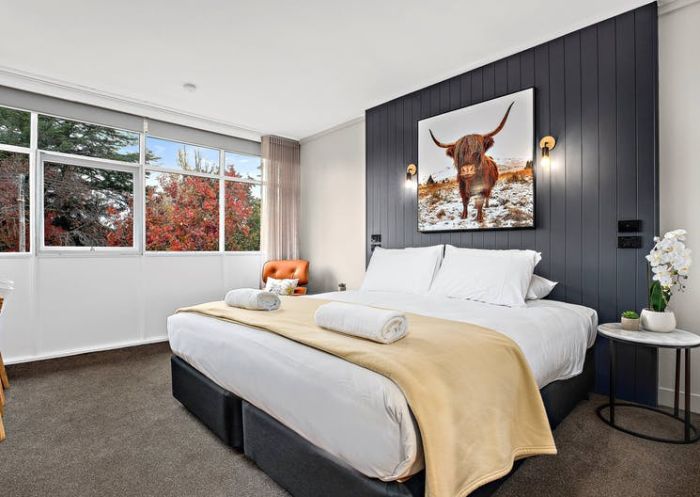
Comfort Inn City Centre, Armidale
This ultra-luxe lodge is committed to protecting its paradisiacal island habitat, home to many rare and endemic species. Capella Lodge uses solar panels to generate 80 per cent of power and rainwater tanks to provide 75 per cent of water, making use of natural ventilation, EcoSmart gas fireplaces that run off green energy, refillable amenity bottles, and an award-winning recycling program. Food miles are almost nil: the island’s fishermen deliver their catch straight to the lodge, to be served with vegetables from the kitchen garden and foraged sea herbs.
How to get involved:
Lord Howe Island hosts wildlife lectures, self-guided surveys, guided nature walks, and snorkels with marine biologists.
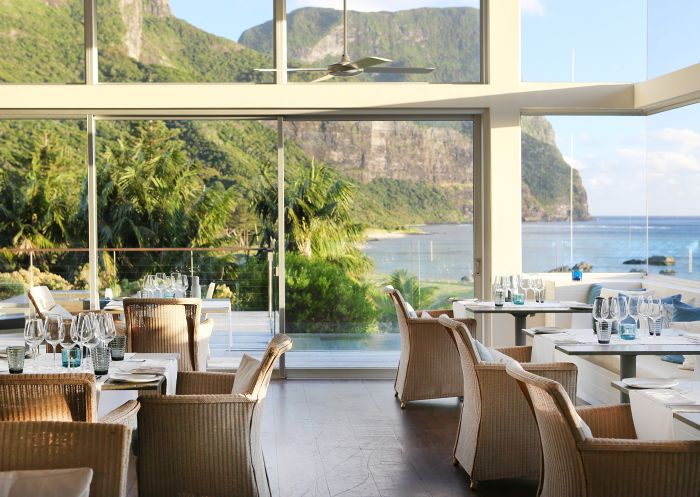
Capella Lodge, Lord Howe Island - Credit: Rhiannon Taylor
A stay at Spicers Vineyards Estate or Spicers Guesthouse is indulgent on the tastebuds but light on the earth. With a dedicated ‘green team’ to drive change, some achievements include banning single-use plastics; using vegan bathroom products, donating old soaps to SoapAid; recycling soft plastics; installing Tesla car chargers (Spicers Guesthouse); sourcing ingredients locally; and establishing kitchen gardens, and purchasing sustainable seafood.
How to get involved:
Ditch the car and visit Hunter Valley’s cellar doors by bicycle (complimentary).
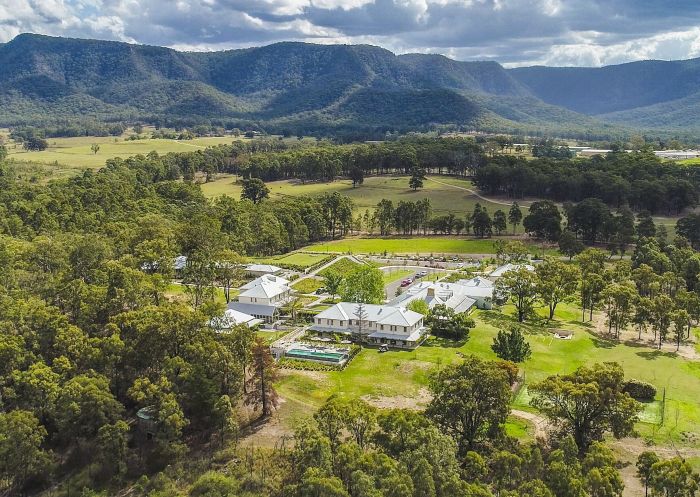
Spicers Vineyards Estate, Pokolbin
Emirates One&Only Wolgan Valley is surrounded by 2800 hectares of protected wilderness within the World Heritage-listed Blue Mountains area, one of the country’s most luxurious stays was the first in the world to achieve internationally accredited carbon neutral status in 2009. Among its long list of achievements, it has reduced its electricity consumption by 48 per cent, 100 per cent of water is recycled on-site, guests eat local and sustainable produce, and any food waste is converted into water.
How to get involved:
Partake in bushfire regeneration (mulching vulnerable areas and planting seeds), conducting wildlife surveys, monitoring wombats for WomSAT, or testing water quality.
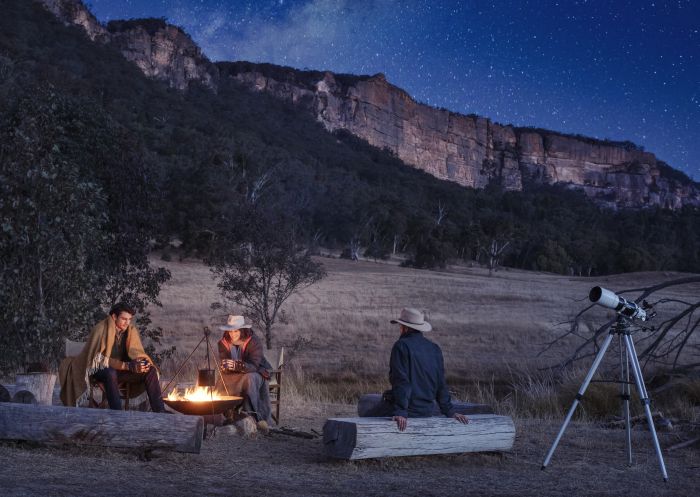
Emirates One&Only Wolgan Valley, Blue Mountains
The owners had the environment top of mind when designing this safari-style Paper Camp back in the ’90s, and today these efforts continue under the guide of a dedicated permaculturalist. Located among eucalyptus and paperbark trees in Jervis Bay, 13 luxe tents are decked out with hardwood floors, plush bedding and a freestanding bath. Tents are solar-powered and make use of natural ventilation, there are no electronics, no fences to allow for a wildlife corridor, and wastewater is pumped from the site to protect the fragile wetland ecosystem.
How to get involved:
Book a snorkel or free dive tour to spot whales, dolphins and seals with eco warriors and Sea Shepherd partners Woebegone, who plant a she-oak tree for every student who joins them.
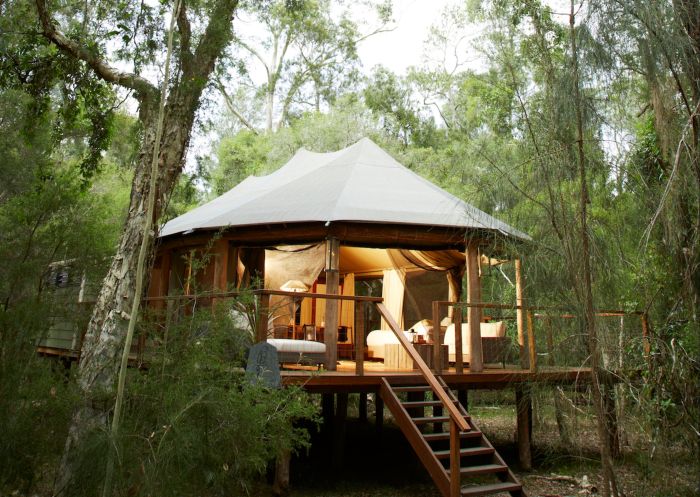
Paperbark Camp, Jervis Bay
All the insider news, tips and inspiration you need to plan your next trip, delivered straight to your inbox.
Sign UpVisitNSW.com is the official tourism site for Destination NSW.
© Copyright 2023 Destination NSW. All rights reserved